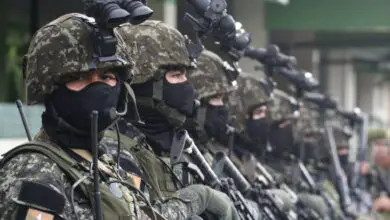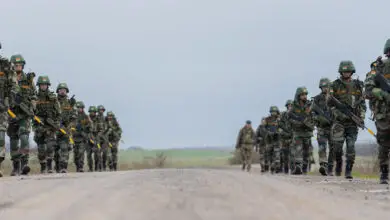
“The only way to win is not to play.” But what if the other side wants to play? In their book 2034, novelist and former Marine Elliot Ackerman and retired NATO Commander Admiral James Stavridis conjure the ultimate trial for American hubris: What if China wants war?
Extrapolating today’s geopolitical trends 13 years into the future, the reader discovers the United States has yet to rectify its waning supremacy as the global superpower that it societally continues to envision itself as.
Our enemies China, Iran, and Russia are emboldened. Our allies India and Europe defy our leadership. Ackerman and Starvris posit America’s influence will not disappear in the next decade; the reality Americans must accept — both the citizenry culturally and the Washington strategists militarily — is that we are reduced to command as much respect as every other superpower.
New Reality
As the novel predicts, America will fail to accept this 21st-century reality and existence.
Protagonist US pilot ‘Wedge’ Mitchell constantly recalls his esteemed ancestry of fighter pilots who fought against America’s enemies in WWII, Vietnam, and the Gulf War. His desire to prove himself by defending American honor in the skies enshrines his belligerent idealism — or fanaticism — to confront the Chinese asymmetric warfare with conventional air strikes.

Likewise, US Commodore Sarah Hunt suppresses a critically conceived strategy in favor of clasping onto American hubris. Despite witnessing Beijing using an electronic systems shutdown attack to destroy her flotilla, she foolishly accepts the US Navy’s directive to counter this electronic warfare by simply amassing a larger conventional fleet. Needless to say, it does not end well.
Combat Asymmetry With Asymmetry
The failure to derive new strategies from military defeats illuminates the authors’ first key warning Americans must adopt in the coming years: today’s warfare does not rely upon yesterday’s weapons.
Our conventional navy powered by high-tech gadgets was rendered mere floating metal by one cyberattack. Instead of countering aggression with escalation — as the first female president does to demonstrate her resolve — the US must prepare to combat asymmetry with asymmetry.
In the novel’s climax, it’s not by matching Chinese power that the US succeeds, but by undermining the People’s Liberation Army’s reliance on electronic warfare through implementing invulnerable low-tech weapons systems.
Multiple Fronts
The authors’ second warning comes from their forebode that America’s powerful adversaries, emboldened by their effortless defeats of US forces early in the novel, will become unpredictable and opportunist as America focuses its efforts in the East China Sea.
While American ships sail towards Beijing, America’s underwater cables in the Atlantic are exposed to the Russians, who simultaneously test NATO without US military support. Iran acts similarly.
But most of all, China, propelled by blind nationalism and its leaders’ determination to deliver increasing results for CCP superiors, will be unable to accept the results of victory — just like the US. Ironically, China will aid America in spinning the vicious cycle of escalation. Albeit the opportunism yields impressive dividends at the outset, their arrogance eventually overextends their capabilities to an apex that ensures their own demise.
America’s ally, India, also seizes the advantage amid the chaos to improve their geopolitical standing. By the novel’s end, India becomes the last standing great power by masterfully playing the great powers off each other. But most of all, Delhi stays out of the fight until the very end.
The authors’ point reinforces the long-understood principle in modern conflict: the winners are not those who fight, lose, and persist (as the US attempts to do), nor are they those that continuously achieve victory (like the Chinese and Russians) because ambition eventually gets the better of them.
Perhaps in the modern age, “no battle is ever won,” as Faulker’s epigraph to the novel reads. “The field only reveals to man his own folly and despair, and victory is an illusion of philosophers and fools.”
2034 is an instant NYT Bestseller. Many thanks to everyone who has picked up this book and the amazing team that has published it @penguinpress @JanklowNesbit pic.twitter.com/193tIJ4CnU
— Elliot Ackerman (@elliotackerman) March 17, 2021
America’s Underappreciated Asset
Ackerman and Stavridis’ final essential message responds to the reader’s preeminent question: how does the US avoid annihilation? Insofar as offering assurances the US will retain its position as the world’s policing superpower, 2034 provides no comfort.
Nevertheless, the story reminds the reader of America’s most underappreciated asset among foreign policy circles: our international cultural connections. It is only through the story’s hero’s (second-generation immigrant US Deputy National Security Advisor Sandeep Chowdhury) familial ties to a chief Indian official that allows the US to employ India as a third-party broker to free ‘Wedge’ Mitchell when he gets captured by Iran.
Additionally, Chowdhury’s connections grant him an alternative, removed perspective, which frees him to accept America’s declining preeminence in the mid-century, contrary to his siloed Americans. This is highlighted when his Indian uncle shows him a picture of his sepoy grandfather fighting for the British in WWII.
Ultimately, his love for America as a second-generation immigrant induces him to advocate for reasoned responses against Chinese aggression to safeguard American itself from decimation, opposed to his “all-American” counterparts who escalate to vainly defend anarchic perceptions of American military supremacy held by their ancestors.
To Defend America or Her Values?
So what will the US do if China wants to play? “Perhaps you’ll win this war,” Chowhurd’s uncle asks, “But for what?” Will we squander our blood and treasure in the distant South China Sea because the US cannot accept the world is “large enough for our government and Beijing’s,” only for us to decline “like the British after the Second World War, your empire dismantled, your society in retreat? And millions of dead on both sides.”
Or, will Americans leave free societies (like Taiwan) that foster the social mobility and cultural acceptance that permitted the next two generations of a lonely sepoy to become leading officials tasked with arbitraging WWIII to an Iron Curtain of authoritarianism? What is our role?
Whichever America concludes to be prudent in the coming decades, one element seems destined: “The America they believe themselves to be is no longer the America that they are.”
New asymmetric strategies, imbued with our geopolitical limitations and capabilities for innovation and cultural connections to form alliances, must materialize in Washington; else, America’s hubris will finally have “gotten the better of its greatness.”
 David (Trace) Held III is a Kelley Scholar at Indiana University, Class of 2024. Having worked for Senate for Todd Young (IN) on Capitol Hill, studied as an Alexander Hamilton Society Fellow, and pursuing a minor in Chinese-US Relations, Trace has rapidly taken on analyzing America’s role regarding East Asia.
David (Trace) Held III is a Kelley Scholar at Indiana University, Class of 2024. Having worked for Senate for Todd Young (IN) on Capitol Hill, studied as an Alexander Hamilton Society Fellow, and pursuing a minor in Chinese-US Relations, Trace has rapidly taken on analyzing America’s role regarding East Asia.
The views and opinions expressed here are those of the author and do not necessarily reflect the editorial position of The Defense Post.
The Defense Post aims to publish a wide range of high-quality opinion and analysis from a diverse array of people – do you want to send us yours? Click here to submit an op-ed.










